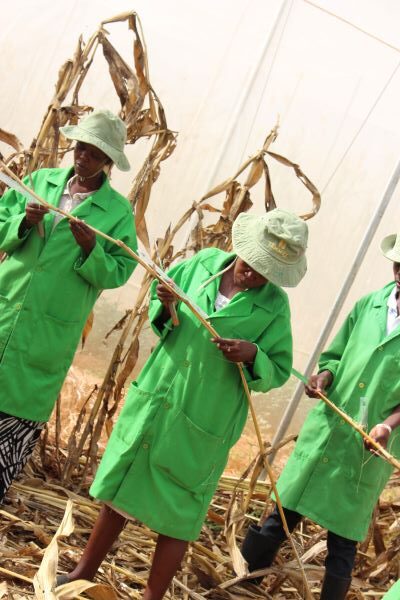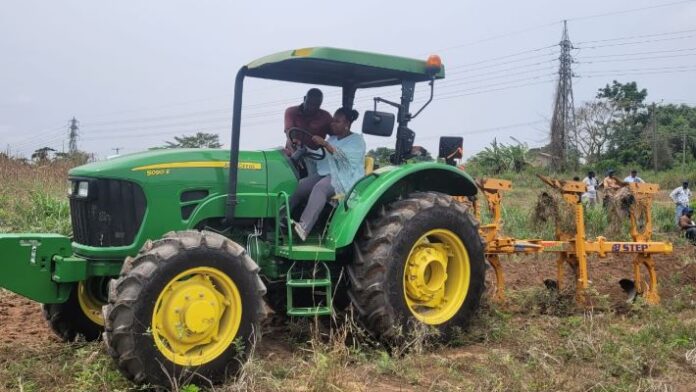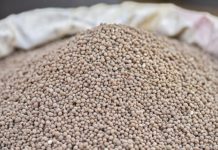In agricultural research, a notable gender gap persists, particularly within the crop breeding sector. While women have often been well-represented in breeding labs and offices, they’ve been less present in field research work. In Kenya, the disparity in this sector is often rooted in cultural norms and community values. This can be seen in plant breeding stations, where tasks such as mechanization, field and outstation trial management are disproportionately led by men.
Just a few years back for example, almost all the technicians working in field stations and data collection at CGIAR1 Kiboko plant breeding stations were men, forming male-dominated teams about 90% of the time.
But things are changing. More and more women are stepping into these field technical roles, and here’s how it’s happening.
Eliminating conscious and unconscious gender bias is a critical initial stride. This involves eradicating biased hiring practices that perceive certain roles as exclusive to one gender. It’s also crucial to challenge mental stereotypes that, for example, automatically associate a woman with the role of an assistant or a man with the role of a lead technician.
CGIAR has been actively working to balance technical teams in all fields in Kenya. They’ve done this by ensuring diverse hiring panels, considering female candidates alongside male and being vocal about it, to change mindset and send a strong message of inclusivity.
Aparna Das, Senior Technical Program Manager for Global Maize Program at CIMMYT, a CGIAR research Center, explains: “At CIMMYT research station hosted by Kenya Agricultural and Livestock Research Organization (KALRO) in Kiboko, where several partner institutions conduct research activities on crop breeding and seed systems, a simple question opened doors. We approached all women working there and asked if they wanted to learn how to drive a tractor – a task usually reserved for men.”
“To our surprise, and this really shows our own bias, many women expressed interest, prompting us to implement a training program to teach them tractor driving.” Das continued. “Often, in our field, opportunities are missed simply because of stereotypes, and because no one thought to ask. By involving women in decision-making, rather than deciding on their behalf, we can create supporting work environments. All these women expressed a desire to learn. Since then, we never assume that a person’s gender dictates their preferences for a task – rather, we ask and give the individual the opportunity to decide.”
Infrastructure matters too. Projects funded by Crops to End Hunger, such as the renovation of the Kenya Plant Health Inspectorate Service (KEPHIS) germplasm exchange facility done in collaboration with CGIAR Centers International Institute of Tropical Agriculture (IITA) and International Potato Center (CIP), along with similar initiatives at stations in Kakamega and Njoro, invest in women’s needs.
“We prioritize accessibility at the design stage”, explained Gustavo Teixeira, Mechanization Specialist and project coordinator for CGIAR Breeding Resources Initiative. “This means, for example, ensuring restroom facilities for women and men in compliance with legal requirements. Having these amenities ensures women can take breaks and address needs like breastfeeding. When procuring equipment, like planters for example, we also consider usability for all individuals.”
Lourine Bii, first technician at Kiboko station, transitioned after four years at KALRO to CIMMYT in 2022. In her current role, she collaborates with scientists, partners, and seed companies to oversee plant breeding trials in East Africa. Her duties encompass ensuring prompt seed delivery, managing trial planting and monitoring processes, collecting high-quality data, and conducting preliminary data analysis.
Bii’s extensive travels across Kenya crop breeding stations necessitate driving a manual car, which she learned with organizational support.
Reflecting on her journey, Bii noted the initial learning curve and the unwavering support from her team. She emphasized her self-reliance: “I didn’t seek special treatment; I simply showcased my capabilities. Driving manual cars on our roads can be challenging, but with CIMMYT’s backing, I’m now fully operational and I manage my trials and research projects without any dependency on others.”

Her colleagues, research technician Andrew Chavangi and research assistant Isaiah Aleri, underscore the benefits of a gender-diverse team.
“Most of the tasks we do can be done by anyone, regardless of gender,” Chavangi remarked. “When Lourine joined us, we didn’t need to alter the way we worked, but her presence has already proven beneficial. Considering most of our end-users – the farmers or smallholders who will use our new crops – are women, having a woman offers different insights and perspectives to help research fully address the challenges of both woman and man farmers in the country.”
Chavangi also noted that majority of casual employees are women, “so having a woman on the team helps us build strong relationships with them, which can sometimes be challenging due to cultural factors.”
Aleri added, “There’s a growing push to encourage women to pursue careers in science, in our field but also beyond. Women scientists can take pride in their skills and be confident in their abilities, because men are ready to support in any way they can!”
Bii, who is now contemplating pursuing a PhD, also encourages women pursuing a career in science to feel self-assured and seize opportunities: “Have confidence in your abilities and don’t be intimidated by job descriptions. My organization invested in me to acquire the necessary skills. I can now pay it forward by helping others. Most organizations agree, as investing in mixed teams is highly profitable for agricultural research.”
Fostering gender equality requires harnessing everyone’s skills and investing in their success. By implementing gender-focused HR policies and investing in infrastructure and training, the agricultural research sector can support the advancement of all individuals and encourages greater participation of women in science.
Although there is still progress to be made, Kenya’s plant breeding stations are at the forefront of promoting inclusiveness. Each incremental advancement fosters a more inclusive culture, making scientific workplaces more welcoming and successful.









